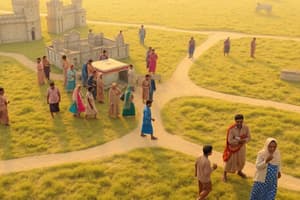Podcast
Questions and Answers
What is the main focus of urban geography?
What is the main focus of urban geography?
- The study of cities and their development (correct)
- The study of population distribution
- The study of cultural beliefs and customs
- The study of rural settlements
What is a megalopolis?
What is a megalopolis?
- A city with a high population density
- A suburban area surrounding a major city
- A large region consisting of several major cities coupled together by extensive transportation systems (correct)
- A city with a population over 10 million
Which of the following is NOT a factor considered in population geography?
Which of the following is NOT a factor considered in population geography?
- Natural resources
- Culture
- Political borders (correct)
- Climate
What does cultural geography examine?
What does cultural geography examine?
Which of the following is an example of a megalopolis?
Which of the following is an example of a megalopolis?
What is the main difference between a megacity and a metro area?
What is the main difference between a megacity and a metro area?
Which of the following is NOT an example of how cultures may become isolated from each other?
Which of the following is NOT an example of how cultures may become isolated from each other?
What does economic geography study?
What does economic geography study?
Which of the following is an example of a factor that economic geographers might examine?
Which of the following is an example of a factor that economic geographers might examine?
What does political geography focus on?
What does political geography focus on?
Which of the following is NOT an example of what political geography might consider?
Which of the following is NOT an example of what political geography might consider?
Which of the following is NOT an aspect that human geography provides insight into?
Which of the following is NOT an aspect that human geography provides insight into?
Flashcards are hidden until you start studying
Study Notes
Human Geography
Human geography is the branch of geography that studies patterns and relationships in the human populations of Earth and their physical environment. It explores spatial variations and seeks to explain them. Here are some aspects of human geography:
Urban Geography
Urban geography focuses on cities and their development. Cities can be classified based on their size with megacities having more than 10 million inhabitants while metro areas have over one million. There is also a trend towards suburbanization where people move out of central cities into surrounding areas.
Megalopolis
A megalopolis is a large region consisting of several major cities coupled together by extensive intercity transportation systems, such as highways, train lines, and airports. This allows commuters to live outside the city, often in less expensive housing, while working inside the city. Examples include Tokyo–Yokohama in Japan and São Paulo in Brazil.
Population Geography
Population geography looks at how humans distribute themselves across the planet's surface. It considers factors like climate, natural resources, and culture when explaining why certain regions receive higher density settlements than others.
Cultural Geography
Cultural geography examines the role of location in shaping people's values, beliefs, customs, and institutions. For example, cultures may become isolated from each other if they are separated by mountain ranges, rivers, or deserts, which can lead to differences in the ways they live. On the other hand, close proximity may allow for cross-cultural exchange and borrowing.
Economic Geography
Economic geography studies the spatial organization of economies. It analyses issues related to the global economy, trade between countries, local labor markets, and international business. Economic geographers examine the impact of location on businesses - for instance, industries located near water sources tend to ship goods via freight because it is cheaper and faster than truck transport.
Political Geography
Political geography involves studying the relationship between politics and space or place. It takes into account boundaries drawn on maps, territorial claims, and the distribution of power within states and internationally. For example, political geography might consider why some places experience conflict and war while others do not.
In summary, human geography provides insight into various aspects of our world including demographic trends, social structures, environmental challenges, resource management, regional conflicts, and globalization processes.
Studying That Suits You
Use AI to generate personalized quizzes and flashcards to suit your learning preferences.




